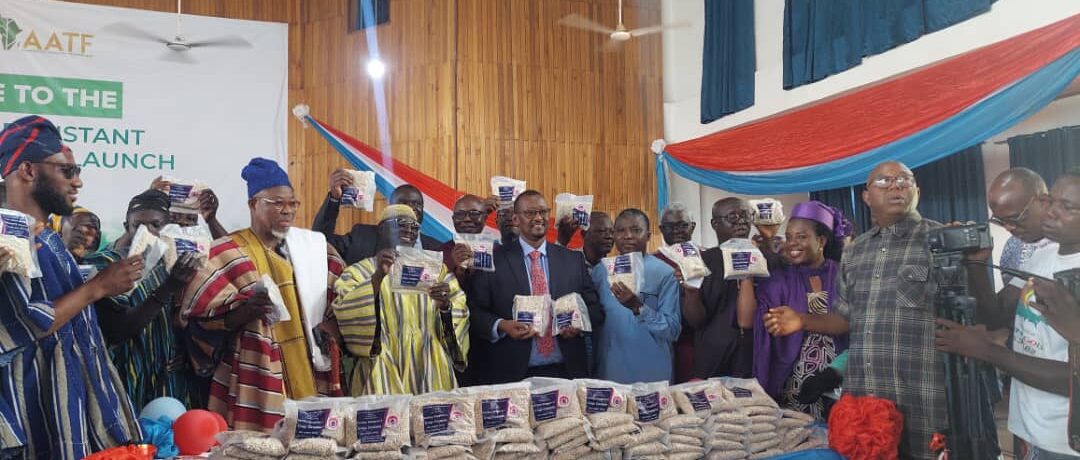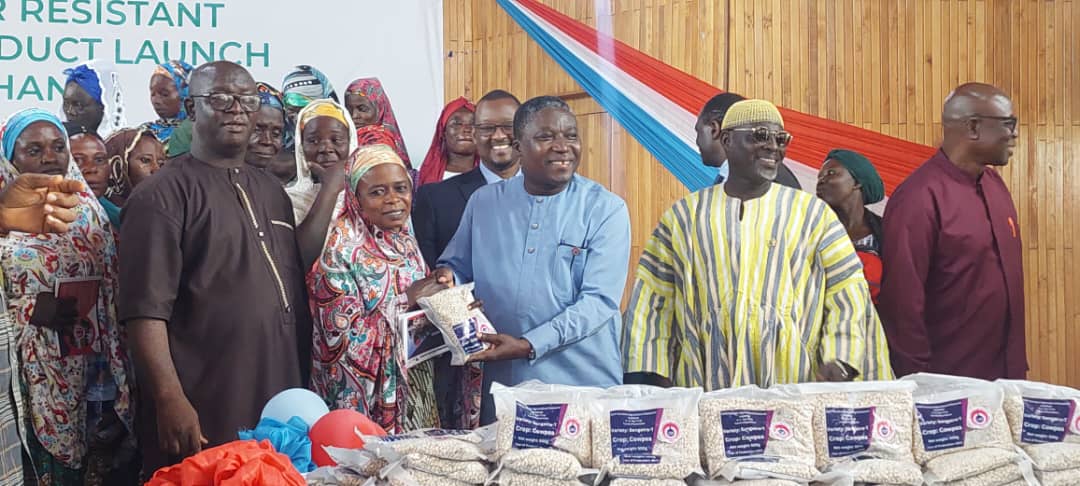

Ghana Releases Her First Biotech Crop: The Pod Borer Resistant Cowpea.
Today, Thursday, 25th July, 2024, Ghana is making history with the commercial release of her first ever biotech crop, “the Pod Borer Resistant Cowpea” (PBR Cowpea). It is developed to specifically resist the Pod Borer pest, scientifically known as “Maruca vitrata,” which destroys yields by boring the pods.
The release of the PBR Cowpea, which is a new variety of the black eye beans, follows 12 years of extensive regulatory, laboratory and field-testing processes by the Council for Scientific and Industrial Research – Savannah Agricultural Research Institute (CSIR-SARI) under the PBR Cowpea Project – a public private partnership coordinated by the African Agricultural Technology Foundation (AATF), to promote technological interventions that will optimize cowpea productivity and utilization in sub-Saharan Africa.
Referred to as “Songotra T,” the PBR Cowpea’s commercial release today became possible following its recent approval for release and registration in Ghana for commercial cultivation by the National Seed Council. This was after the National Biosafety Authority (NBA)’s approval of the application submitted by the CSIR for the PBR cowpea’s environmental release and placement on the market.
The release event takes place today at SARI’s premises in Nyankpala, in Ghana’s Northern Region.
CSIR Committed to Cutting Edge Science
The Director-General of the CSIR, Prof. Paul Bosu has described the event as “a great day for Ghana’s agriculture and food security drive …, a historic and significant development for African agriculture, with the CSIR setting the pace and making history… .”
In an interview, Prof. Bosu noted that the CSIR has a long history of delivering the best to the nation in the area of technology development and dissemination. He stated that “the Songotra T is one of such technologies” and therefore urged farmers “to take advantage of it to increase their cowpea production and thereby increase their wealth.”
The Director-General, pledged the commitment of CSIR and its various institutes to continue using cutting-edge science to tackle all challenges that militate against national development. He emphasized that “in agriculture, CSIR is committed to safely using biotechnological approaches such as the genetic modification techniques, where necessary to solve food security challenges.”
He commended the Director, management and research team working on the PBR Cowpea for their tenacity and resolve to making sure that farmers have access to the best.
Prof. Bosu also celebrated the excellent collaboration between the CSIR and its partners that has resulted in the success of the PBR Cowpea Project in Ghana. The partners include: the AATF, the Australia based Commonwealth Scientific and Industrial Research (CSIRO), USA based Danforth Plant Science Centre, Institute for Agricultural Research (IAR) based in Zaria, Nigeria and the Institute for Environment and Agricultural Research (INERA) in Burkina Faso.
Ghana’s PBR Cowpea Release a Dream Fulfilled
For his part, the Special Advisor to the Program for Biosafety System (PBS) in Ghana and former Director-General of the CSIR, Prof. Walter Alhassan says the release of the PBR cowpea in Ghana “is a fulfillment of my long-standing dream for the launch of a safe biotechnology product in Ghana.”
In an interview, the visibly jubilant ardent advocate for safe biotechnology in agriculture in Africa and especially in Ghana, stated: “I’m thrilled about this development.” He recalled that work to advance the application of safe biotechnology in Ghana for him, started way back in 2005 with the concentration on biosafety assisted by International Food Policy Research Institute (IFPRI) Program for Biosafety Systems (PBS) based in Washington DC.
Prof. Alhassan noted that all the years in his advocacy for biotechnology in Ghana, he had had a problem answering the farmer’s question “Where is the product?” He was thankful that the release event has finally given him an answer: “Now the product is here and will certainly advance the cause of food security in Ghana.”
In a conversation with a Senior Research Scientist & Entomologist, at CSIR-SARI, Nyankpala, Dr. Jerry Nboyine, who is also the current Principal Investigator on the PBR Cowpea Project, recounted some of the processes the implementing team had to go through.
He said the Songotra T Cowpea variety has undergone rigorous biosafety review and risk assessment, after which it was approved by the National Biosafety Authority as safe for use as food and feed. From the biosafety approval, it underwent extensive field trials in all the major Cowpea growing ecologies in Northern Ghana.
Subsequently, a dossier was submitted to the National Seed Council after the National Variety Release and Registration Committee inspected release plots at CSIR-SARI. The members of the Committee were satisfied and approval was granted this year (2024) for it to be used as a Cowpea variety for cultivation in Ghana.
Dr. Nboyine explained that the PBR cowpea was developed in response to cowpea farmers woes of low yields caused by the legume pod borer, extensive use of pesticides to protect the crop from the pod borer, the health hazards for the farmers and consumers as well as the negative impacts on the environment.
Other scientists that worked on the project were: Ms Gloria Adazebra, Cowpea Breeder, Philip Agrengsore, Seed Scientist, Frederick Anaman, Technical Officer, Haruna K. Ali, Chief Technical Officer, Dr Francis Kusi, Principal Scientist, all of CSIR-SARI. The work was initially started under Dr. I.D.K. Atokple, the first Principal Investigator, who handed over to Dr. Mumuni Abudulai, the second Principal Investigator.
Scientists Commend Ghana
Meanwhile, scientists and scientific institutions involved in biotechnology related fields are commending Ghana for making this significant progress in agricultural biotechnology.
On behalf of the African Genetic Biocontrol Consortium, Dr. Willy Tonui congratulated Ghana for taking such a bold step towards environmental release of such an important crop. “This is no mean achievement, but a result of a robust biosafety regulatory framework that has been put in place by the Government of Ghana,” he observed in a telephone interview.
Dr. Tonui noted that having a functional National Biosafety Authority (NBA) is testimony of the commitment of the Government of Ghana to support adoption and advancement of novel biotechnologies in the country.
He applauded the CSIR-SARI research team and the institutional leadership for the success story and said having a community that is also accepting new technologies is a great step towards building trust in these new technologies.
He assured Ghanaians of the safety of this new cowpea, because internationally and regionally the scientific community has adopted sound procedures and guidelines that promote safe assessments and decision -making processes for evaluating GMOs. “Therefore, the consumers of this new crop should feel confident that the crop is safe,” Dr. Tonui added.
The Deputy Director, Administration, Teaching and Learning, of the West Africa Centre for Crop Improvement (WACCI) of the University of Ghana, Dr. Daniel Dzidzienyo, has welcomed this development as a significant milestone in the nation’s agricultural biotechnology landscape.
“This step,” he said, “aligns Ghana with other African countries like Nigeria, which have also adopted GM crops to address agricultural challenges”
Dr. Dzidzienyo who is also a Senior Lecturer, at the University of Ghana’s Biotechnology Centre, said the event reflects years of research and development aimed at improving crop productivity and food security through the PBR cowpea enhanced with a gene that provides resistance to the Maruca vitrata, which causes substantial yield losses.
“So, the GM cowpea promises to enhance yields, reduce the need for chemical pesticides, and offer economic benefits to farmers,” adding, “this is particularly crucial for Ghana, where cowpea is a staple food and an important source of protein.”
Dr. Dzidzienyo however pointed out that the launch of this new cowpea variety calls for intensified public education and dialogue to address any concerns about the GM technology. He noted that “transparent communication about the benefits and safety of the PBR cowpea will be key to gaining public trust and acceptance.”
Story By: Ama Kudom-Agyemang

Leave A Comment